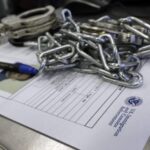

The prosecution and defense painted very different pictures in the joint trial of a group of Jan. 6 defendants, including members of the right-wing Oath Keepers militia, when opening arguments and testimony started on Monday.
At Washington, D.C.’s federal courthouse, prosecutors are working to jointly try the defendants with a rare Civil War-era “seditious conspiracy” charge, which carries a maximum of 20 years in prison. They allege that the group meticulously planned for months to use Jan. 6 as a springboard to start an armed insurrection to overthrow U.S. democracy.
The defendants, who have pleaded not guilty to charge of seditious conspiracy and other charges, claim that the members of the Oath Keepers present were only attempting to legally provide security to the Jan. 6 demonstration, and were not involved in the bulk of the violence at the Capitol that day in 2021. One defendant, retired Navy Lt. Cmdr. Thomas Caldwell, 68, claims he was never even a member of the Oath Keepers, despite being lumped in with them, and never entered the Capitol on Jan. 6.
“Notice the role these five defendants played: leaders,” Assistant U.S. Attorney Jeffrey Nestler said in the government’s opening remarks, according to CNN. He described the role of Stewart Rhodes, the leader of the Oath Keepers who is one of the people on trial, as being “like a general overlooking a battlefield while his troops stormed inside.”
NEW DATE EMERGES FOR CLIMACTIC JAN. 6 HEARING POSTPONED DUE TO HURRICANE
“Their goal was to stop by whatever means necessary the lawful transfer of presidential power, including by taking up arms against the United States government,” Nestler proclaimed. “They concocted a plan for armed rebellion to shatter a bedrock of American democracy.”
The prosecution made extensive use of posters and screens to detail the activities of the group on that day, as well as displaying seized group messages and audio clips between each other. They made particular use of violent rhetoric used by the defendants, which they pointed to as proving intricate planning to overthrow the government.
The wife of one defendant, retired Army Sgt. Kenneth Harrelson, said this is a “repeat” of what has been said for nearly two years.
“It feels to me like a joke, a show. That’s all it feels like to me is a show. And a show to which you just want to fall to sleep to,” she told the Washington Examiner.
Angel Harrelson and Sharon Caldwell, wife of Thomas Caldwell, both laughed off the arguments of prosecutors, calling them absurd. They particularly found humor in Nestler’s argument that Caldwell aimed to use his experience in the Navy to “use boats to get across the Potomac” as part of a grand plan to seize the Capitol.
“Like George Washington crossing the Delaware,” Sharon Caldwell joked.
The two dismissed the violent rhetoric seen in private messages as simple banter.
Sharon Caldwell told the Washington Examiner that she was with her husband the whole day on Jan. 6, outside the Capitol, and that the two of them never went inside. She maintained that the two of them hardly knew the Oath Keepers as an organization, only befriending a few members independent of their group affiliation previously. Several Oath Keepers had Caldwell in their contacts on their phones as “Commander Tom,” not because he was their literal commander, but because it is customary for veterans to refer to each other by their former rank, she said, and the group didn’t know his last name.
Sharon herself is going to take the stand at some point in the trial.
CLICK HERE FOR MORE FROM THE WASHINGTON EXAMINER
“I am optimistic, it is very nice to finally be on the offense instead of on the defense. I’ll be taking the stand… we finally get to speak the truth,” she told the Washington Examiner. “I am fully optimistic he will be acquitted.”
The high-profile trial is expected to take a minimum of five weeks, with the true length likely to go over that.






